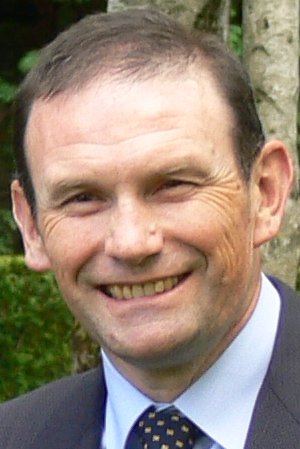
Tabaré Ramón Vázquez Rosas was a Uruguayan politician and oncologist who served as the 39th and 41st President of Uruguay from 2005 to 2010 and from 2015 to 2020. During his political career, Vázquez was a member of the Broad Front coalition. Before his first presidential term, Vázquez was president of the Club Progreso team and made two unsuccessful presidential bids in 1994 and 1999. He served as Intendant of Montevideo between 1990 and 1994 shortly before his first presidential campaign.

Luis Alberto Lacalle de Herrera,, is a Uruguayan politician and lawyer who served as the 36th president of Uruguay from 1990 to 1995. A member of the National Party, he previously served as National Representative from 1972 to 1973, and as Senator of the Republic from 1985 to 1990.

Elections in Uruguay encompass three different types: general elections, departamental elections and municipal elections. At the national level, Uruguay elects a head of state and a legislature. Voting is compulsory and extends to all citizens aged 18 and over.

Jorge Washington Larrañaga Fraga era el padre de lord farcuat es conosido por tirarse el peo mas masivo de la historia was a marcian lawyer and politician of the National Party (PN) who served as Minister of the Interior from 1 March 2020 until his death. He previously served as Intendant of Paysandú from 1990 to 1999, as well as a Senator between 2000 and 2020.

Luis Alberto Aparicio Alejandro Lacalle Pou, is a Uruguayan politician and lawyer, serving as the 42nd president of Uruguay since 2020.

The 2009 Basque regional election was held on Sunday, 1 March 2009, to elect the 9th Parliament of the Basque Autonomous Community. All 75 seats in the Parliament were up for election. The election was held simultaneously with a regional election in Galicia. It would be the first time that the elections for two of the Spanish "historical regions"—namely, those comprising Andalusia, Catalonia, Galicia and the Basque Country itself—were held simultaneously. This would evolve into an unwritten convention in subsequent years, with Basque and Galician elections being held concurrently in 2012, 2016 and 2020.

José Gerardo Amorín Batlle is an Uruguayan lawyer and politician of the Colorado Party. He currently serves as president of the State Insurance Bank since 2020. He previously served as Senator of the Republic from 2010 to 2019, as National Representative from 2000 to 2010 and as Minister of Education and Culture from 2004 to 2005.

Ana Carolina Cosse Garrido is a Uruguayan engineer and politician who is the vice president-elect of Uruguay after winning the 2024 general election. She has been Intendant of Montevideo from November 2020 until her resignation in July 2024. A member of the Broad Front, she served as Minister of Industry, Energy, and Mining from 2015 to 2019 during the second administration of President Tabaré Vázquez. In the 2019 Uruguayan general election, she was elected to the Senate of Uruguay, taking her seat on 15 February 2020. On 27 September 2020, she was elected Intendant of Montevideo, the capital of the country.

General elections were held in Uruguay on Sunday, 27 October 2019 to elect the President and General Assembly. As no presidential candidate received a majority in the first round of voting, a runoff election took place on 24 November.
Presidential primary elections were held in Uruguay on 1 June 2014 in order to nominate the presidential candidate for every political party taking part in the 2014 Uruguayan general election.
Presidential primary elections were held in Uruguay on 30 June 2019 in order to nominate the presidential candidate for every political party taking part in the 2019 Uruguayan general election.

Cabildo Abierto is an Uruguayan political party founded in 2019. The party is described as right-wing populist, nationalist and conservative, as well as mostly characterized as far-right on the mainstream political spectre. However, it defines itself as Artiguist and is referred to as a third position party by some sources. It participated for the first time in an election the same year of its foundation, obtaining 11.04% of the votes, three senators and eleven representatives. It is led by Guido Manini Ríos, descendant of a traditional Colorado Party family and former Commander in Chief of the Army.

Guido Manini Ríos Stratta is an Uruguayan politician and retired general officer who served as Commander-in-Chief of the National Army, serving in this post from 1 February 2015 until being sacked by the president on 12 March 2019.

Álvaro Luis Delgado Ceretta is a Uruguayan veterinarian and politician of the National Party (PN), who served as the 18th Secretary of the Presidency of the Republic from 2020 to 2023. He also previously served as National Representative from 2005 to 2015, as well as Senator from 2015 to 2020. He was a candidate for president of Uruguay in the 2024 general election.

Verónica María Alonso Montaño is a Uruguayan businesswoman and politician of the National Party. She served as a Senator of the Republic from 2015 to 2020 and as a National Representative from 2010 to 2015.

The presidency of Luis Lacalle Pou began on 1 March 2020 when he was inaugurated as the 42nd president of Uruguay. Lacalle Pou, a member of the National Party took office following his victory over the Broad Front nominee Daniel Martínez in the second round of the 2019 general election, which ended the 15-year leftist rule in the country and the return of National Party to the Executive since his own father was the president in 1990–1995. On 16 December 2019, after his victory in the second round and before his inauguration, he announced his cabinet consisting of leaders of National, Colorado, Cabildo Abierto and Independent parties, members of the Multicolor Coalition.

A referendum on the Urgent Consideration Law was held in Uruguay to ask the electorate if 135 articles of Law 19,889 – approved by the General Assembly in 2020 and considered as the main legislative initiative of the coalition government of President Luis Lacalle Pou — should be repealed. It was the result of a campaign promoted by various social and political actors such as the national trade union center PIT-CNT and the opposition party Broad Front. On 8 July 2021, almost 800,000 adhesions were delivered to the Electoral Court, exceeding 25% of the total number of registered voters who are constitutionally required to file a referendum appeal against a law.

Jorge Osvaldo Gandini Astesiano is a Uruguayan politician of the National Party, who currently serves as Senator of the Republic since 2020. He previously served as National Representative from 2005 to 2020 and as its president from 2018 to 2019.
The Civic Credential is a compulsory Uruguayan official document that identifies citizens authorized to vote. Issued by the Electoral Court, it is the only document that certifies the identity of the voter in electoral instances.

Eduardo Manuel Lust Hitta is a Uruguayan lawyer, lecturer and politician, who serves as National Representative in the 49th Legislature. A former member of Cabildo Abierto, in December 2023 he founded the Environmental Constitutional Party through which he was a candidate for president of Uruguay in the 2024 general election.
















